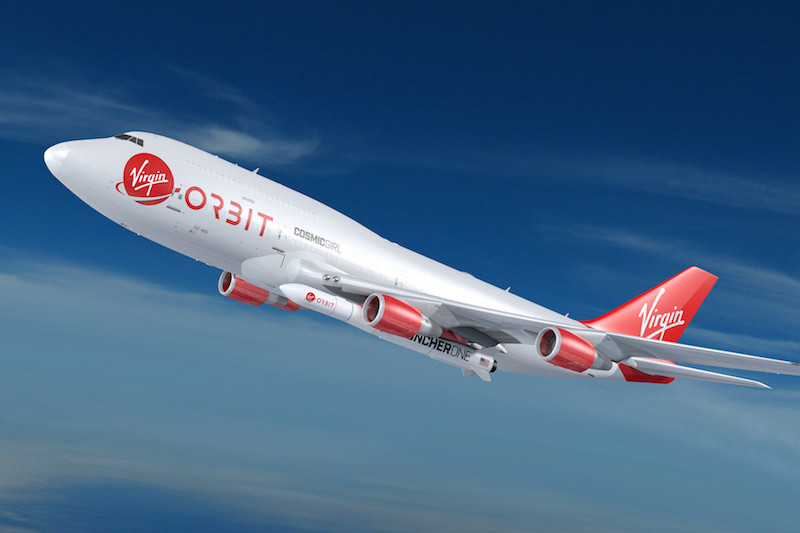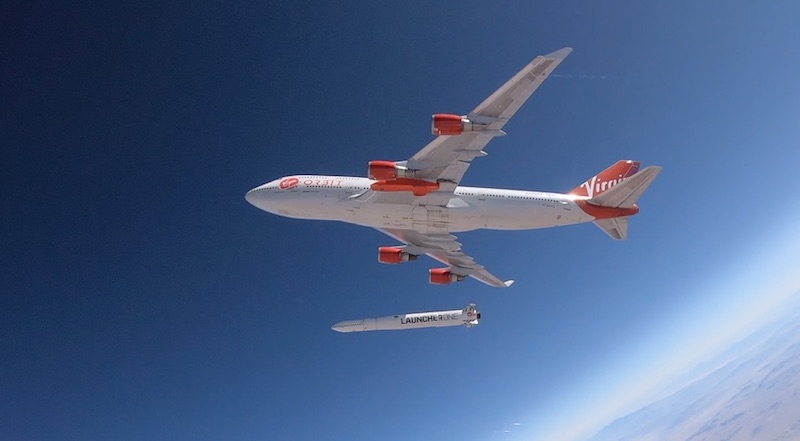
Liftoff! June 30, 2021
Virgin Orbit celebrated the success of its third-ever space mission on June 30, 2021. The successful launch carried seven satellites to their target orbits. The company’s air-launched rocket, LauncherOne, took off from the Mojave Air and Space Port in Southern California beneath the wing of its Boeing 747 carrier plane, also known as Cosmic Girl. Liftoff came at 9:50 a.m. EDT (13:50 UTC), and the rocket deployed high above the Pacific Ocean almost an hour later at 10:47 a.m. (14:47 UTC). Virgin Orbit announced via Twitter that all seven payloads had successfully reached their target orbits shortly afterwards.
Closing out this thread with a final confirmation that all payloads have been successfully deployed into our target orbit. Another fantastic day for the Virgin Orbit team, and a big step forward for our three customers!
— Virgin Orbit (@VirginOrbit) June 30, 2021
LauncherOne is a 70-foot-long (21-m-long) two-stage rocket, capable of delivering up to 1,100 pounds (500 kg) of freight to orbit. One feature unique to LauncherOne is its air-launch strategy, a method performed by separating from Cosmic Girl at an altitude of roughly 35,000 feet (10,700 m) and thrusting into low-Earth orbit from that point. Virgin Orbit representatives claim that this method increases flexibility and responsiveness when compared to vertical launches, at least in the case of LauncherOne.
The company also employs this strategy with its space tourism plane, SpaceShipTwo.
The current target price for LauncherOne is below $10 million per flight and is expected to be joined by dozens of new launch vehicles manufactured by Virgin Orbit in the coming years. Numerous large global networks are in development by companies like SpaceX, SITAEL, and the formerly-bankrupt OneWeb, looking to connect us across vast distances, stimulate the global economy, and expand the limits of human knowledge: an industry Virgin Orbit is hoping to assist in.
Another customer is a subsidiary of Virgin Orbit called VOX Space, created in the early 2020s and intended to use the LauncherOne launch vehicle. The company plans to supply launch services for the U.S. military, sometimes referred to as the “national security launch market.” In April 2020, VOX Space was awarded a $35 million contract for three launches of 44 cubesats.
A different project Virgin Orbit took interest in was in response to the coronavirus pandemic in early 2020, when the company announced it would help build comparatively low-grade mechanical ventilators (breathing machines) to address the critical global shortage of mechanical ventilators. To develop and produce them, Virgin Orbit, the University of California, Irvine, and the University of Texas at Austin formed the Bridge Ventilator Consortium.
Virgin Orbit goal is affordable launch services
Virgin Orbit, formed in 2017, is a spin-off of American spaceflight company Virgin Galactic, which founder Richard Branson said was separated to better position itself to serve the booming small-satellite industry. The company claims that its mission, among other things, is to “open space to everyone” by providing the burgeoning small-satellite industry with low-cost, quick-turnaround launch services to orbit.
Based in Long Beach, California, Virgin Orbit CEO George Whitesides maintains the same role in Virgin Galactic, while day-to-day operations land in the hands of Dan Hart, the veteran Boeing executive hired away to become Orbit’s president. Hart said, during a Space.com interview:
It’s been clear to me that there’s been something changing, and I’ve really admired a lot of the bold moves that have gone on in the industry over the last five to 10 years, where people are doing commercially what was once only done with large, large government-funded programs. My favorite times in my career have always been to driving teams to aggressive goals and achieving those. I just see this team as tremendously capable. It’s kind of an all-star team, driving toward an objective and doing really well against that with a greater purpose. I’ve had a great journey across Boeing through ELVs [expendable launch vehicles] and the Delta program, missile defense systems, satellites big and small. So I’ve really enjoyed that. I just see this as a logical next step in my journey.
Lauren Napier, a Ph.D. researcher in space law and policy at Northumbria University, Newcastle, wrote that satellites have become smaller, cheaper, and easier to make with commercial off-the-shelf parts in recent years. Some even weigh as little as one gram. This means more people can afford to send them into orbit. Now, satellite operators have started launching megaconstellations – groups of hundreds or even thousands of small satellites working together – into orbit around Earth. Such a rapidly growing industry requires a launch service that is as agile and affordable as the satellites themselves.

Bottom line: Virgin Orbit’s air-launched rocket, LauncherOne, carried seven satellites to their target orbits on June 30, 2021. The team claims that their mission, among other things, is to “open space to everyone” by providing the burgeoning small-satellite industry with low-cost, quick-turnaround launch services to orbit.











